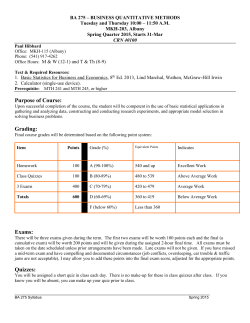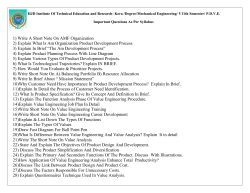
COVER SHEET Administrative - Master Syllabus
Administrative - Master Syllabus COVER SHEET Purpose: It is the intention of this Administrative-Master Syllabus to provide a general description of the course, outline the required elements of the course and to lay the foundation for course assessment for the improvement of student learning, as specified by the faculty of Wharton County Junior College, regardless of who teaches the course, the timeframe by which it is instructed, or the instructional method by which the course is delivered. It is not intended to restrict the manner by which an individual faculty member teaches the course but to be an administrative tool to aid in the improvement of instruction. Course Title - Programming for Discrete Electronic Devices Course Prefix and Number - CETT 1331 Department – Electronics Eng. Tech. Division - Technology and Business Course Type: (check one) Academic General Education Course (from ACGM – but not in WCJC Core) Academic WCJC Core Course WECM course (This course is a Special Topics or Unique Needs Course: Y or N ) Semester Credit Hours # : Lecture Hours # : Lab/Other Hours # 3:3:1 Equated Pay hours for course – 3.5 Course Catalog Description - Introduction to a high level programming language. Includes structured programming and problem solving applicable to discrete electronic devices and how they apply to technical applications. Lecture and lab programming practice using Python. Practicum Hours Other (list) Prerequisites/Co-Requisites – MATH 1314 Prepared by David Kucera Reviewed by Department Head List Lab/ Other Hours Lab Hours 1 Clinical Hours Date 06/18/13 David Kucera Date 08/15/13 Accuracy Verified by Division Chair David Kucera Approved by Dean or Vice President of Instruction Date 08/15/13 Amy LaPan Date1/30/2014 Administrative-Master Syllabus revised April 2013 Page 1 of 4 Administrative - Master Syllabus I. Topical Outline – Each offering of this course must include the following topics (be sure to include information regarding lab, practicum, clinical or other non lecture instruction): The following performance will be expected of any student completing this course with a passing grade. There is no absolute time limit on the performance of these objectives, unless noted, but the grade received by the student will depend, in part, on the relative speed and precision of the student's performance in these tasks. Where subjective evaluations are indicated, the instructor will make these judgments based on his or her knowledge of the skills required to place a graduate with the expectation of successful on-job performance. The student will be expected to perform the following tasks in written examination or laboratory demonstration: *Define, give examples of, and clearly differentiate between hardware and software. *Define the nature of algorithms *Describe the functioning of flowcharts and logic diagrams *Use Boolean equations to make choices *Understand the difference between high and low level languages *Demonstrate the use of input and output statements. *Convert text files to program code. *Use mathematical operators as part of program code. *Demonstrate the importance of formatting techniques and documentation. *Demonstrate the use of loops *Understand the significance of infinite loops *Use repeating mechanisms in programs. *Describe the importance of making programs user friendly. *Demonstrate the use of logical debugging techniques. *Write functional programs of a technical nature using correct code. *Understand the different data types including lists. *Use FUNCTIONS as part of a program *Demonstrate the ability to solve a problem by logically breaking it down into sections. Administrative-Master Syllabus revised April 2013 Page 2 of 4 II. Course Learning Outcomes Course Learning Outcome Upon successful completion of this course, students will: Use structured programming methods to develop and execute high-level language programs which solve technical problems. Methods of Assessment Exams Homework Programming Projects Quizzes Reassessed in Capstone Experience: ELMT 2349 Final Project course. III. Required Text(s), Optional Text(s) and/or Materials to be Supplied by Student. An appropriate electronics text covering PYTHON. Example-How to think like a Computer Scientist. http://www.openbookproject.net/thinkcs/python/english3e/ IV. Suggested Course Maximum - 20 lecture, 20 laboratory V. List any specific spatial or physical requirements beyond a typical classroom required to teach the course. Lecture facilities for 20 students. Laboratory facilities for 20 students must include 20bench positions each with a PC capable of running Windows and PYTHON. PCs must have internet access . VI. Course Requirements/Grading System – Describe any course specific requirements such as research papers or reading assignments and the generalized grading format for the course Evaluation of Performance: Course grades will be determined by the percentage of course objectives for which the student can demonstrate mastery and by attendance as stated in the Departmental Policy sheet provided to the student. Mastery of course objectives will be determined by written examinations, an attendance grade as described in the Departmental Policy handout, a daily work grade which will include graded homework, graded laboratory work, and a comprehensive final exam. Approximate Grade Evaluation Summary: Major tests Attendance Lab reports, homework, and quizzes Comprehensive Final examination 60% 10% 15% 15% Grade Scale: 90 to 100: A 80 to 89: B 70 to 79: C 60 to 69: D 0 to 59: F Administrative-Master Syllabus revised April 2013 Page 3 of 4 VII. Curriculum Checklist - Academic General Education Course (from ACGM – but not in WCJC Core) No additional documentation needed - Academic WCJC Core Course Attach the Core Curriculum Checklist, including the following: Basic Intellectual Competencies Perspectives Exemplary Educational Objectives - WECM Courses If needed, revise the Program SCANS Matrix & Competencies Checklist Administrative-Master Syllabus revised April 2013 Page 4 of 4
© Copyright 2025





















